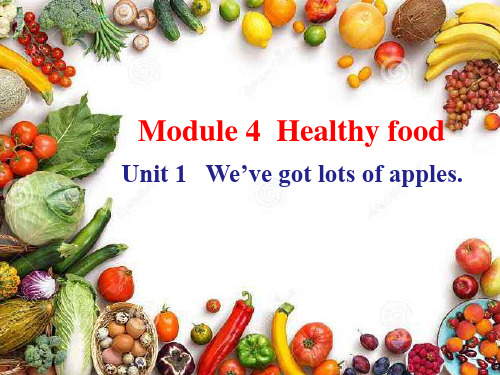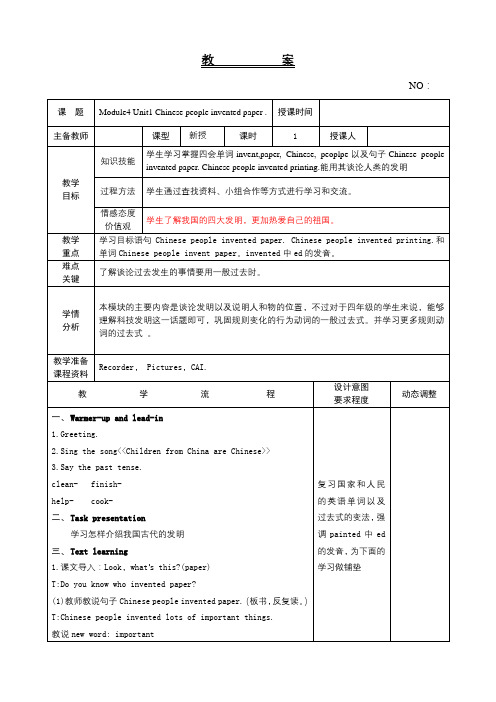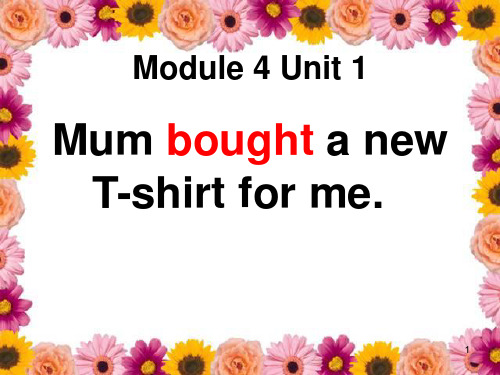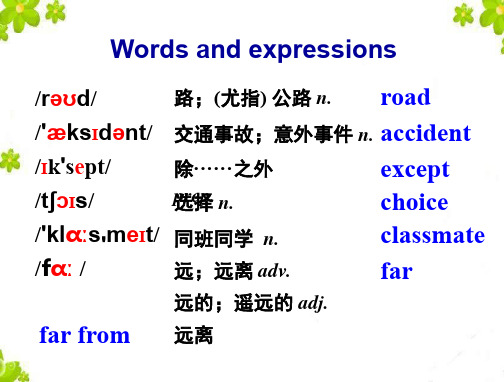Module4 unit1
Module 4 Unit 1小学一年级英语教案

Module 4 Unit 1小学一年级英语教案教学目标1.学生能正确说出以下单词:apple, banana, pear, orange。
2.学生能使用英语表达“我喜欢…”3.学生能理解并回答关于喜欢的英语问题,例如“Do you like apples?”教学准备1.单词卡片:apple, banana, pear, orange2.图片、卡通贴画等教具3.CD机和录音CD4.课本和练习册教学步骤Step 1:引入在引入时,可以使用图片、卡通贴画等教具,让学生对水果有一个直观的认识。
教师可以把水果从教师桌上拿出来,和学生共同观察。
先问(看):What fruit is this? 然后教师可以边出示卡片边读单词,慢慢教会学生apple、banana、pear、orange这四个单词。
教师可以通过比较这四种水果的颜色、形状、口感和味道等,让学生了解水果的不同特点。
例如:•Apple is red, yellow or green. It’s round and firm. It’s juicy and sweet.•Banana is yellow. It’s long and curved. It’s soft and sweet.•Pear is green or yellow. It’s pear-shaped. It’s juicy and juicy and sweet.•Orange is orange. It’s round. It’s juicy and sour.Step 2:教授问答教师可以使用手势和肢体语言帮助学生理解以下问答。
Q: What fruit do you like?A: I like apples/bananas/pears/oranges.教师可以把这个问答反复练习、模仿。
在这个活动中,可以训练学生音标的发音、认读字母和单词,也可训练学生的听力和口语表达能力。
小学英语《Module 4 Unit 1 What are you doing》优质教案、教学设计

《Module 4 Unit1》教学设计【教学内容】外语教学与研究出版社《英语》学生用书第四册第四模块第一单元【教材简析】本册教材为外语教学与研究出版社《英语》学生用书第四册,共分为10 个学习模块和1 个复习模块。
每个模块分为两个单元。
第一单元多少以对话的形式呈现,是新知识的呈现和运用部分,第二单元则多少提供了若干任务型练习和活动,是新知识的巩固和拓展部分。
本册书共有Weather, Family, Activities, Telephone, Games, Routines, Children’s Day, Positions, Directions 九个话题。
同时,我们将学习33 个主要句式与单词表中呈现的122 个单词。
本册所安排的6 首歌曲,1 首诗歌,2 首韵律诗,1 首rap,为教学提供了生动活泼的活动内容,让学生们从中体验、感受语音的规则并巩固相应的知识要点。
在学习中,我们和学生一起了解发生在Amy\ San\ Daming 之间的一个有趣的故事,并同时学习如何用英语来询问天气的情况:听大明如何用英语介绍他的摄影作品:走进芳芳的内心世界去了解她不快乐的原因:通过询问路线帮助Sam 去找Daming 的家等等。
本册教材在知识点的编排上注意了将同一语法点在不同的模块里反复出现,如:2-8 模块以现在进行时为主要语法点,依次对现在进行时态不同人称的陈述句、否定句和一般疑问句进行学习, 让学生循序渐进地掌握知识。
本课时为第四模块的第一课时,话题主要为making calls,主要是两个对话的学习:Are you drinking? No, I’m not. What are you doing? I’m talking to you.用这两个句型来猜测和询问正在发生的事情。
本课的课文情境是Lingling 给Amy 打电话,听到电话里传来噪音,就问Amy 是否在喝饮料或者吃东西,Amy 说自己没喝饮料也没吃东西,Lingling 问Amy 到底在做什么,Amy 开玩笑地说在和她说话呢。
Module 4 Unit 1 2022-2023学年外研版七年级英语上册

Unit 1 We’ve got lots of apples.
Let’s buy some food and drinks.
fruit 水果
apples['[æ'æppl]lz]
oorraannggees ['ɒrɪndʒ]z]
有
We have got some apples and oranges.
We have got some _c_h_o_c_o_la_t_e_._
We have got some _te_a_,_o_r_a_n_g_e__ju_i_c_e_,_c_o_f_fe_e_,_w__a_te_r_, _m_i_lk__a_n_d__c_o_la_._
apples oranges
vegetables 蔬菜
beans['bi:nz] carrots[[''kkæærrəətt]s]
We have got some beans and carrots.
vegetables 蔬菜
ppoottaattooes totommaatotoes [pə'teɪtəʊ]z] [[ttəə''mmɑɑ::ttəəʊʊz]]
We have got some _be_a_n_s_,_c_a_rr_o_ts_,_p_o_ta_t_o_es__a_n_d_to_m__a_to_es.
★可数名词复数以元音结尾,读/z/
We have got some a_p__p_le_s__a_n_d_o_r_a_n_g_e_s_._ We have got some b_e_a_n_s_, _ca_r_ro_t_s_, _p_o_ta_to_e_s_a_n_d__to_m_a_t_o_es. We have got some b__e_e_f _a_n_d_c_h_i_c_k_e_n_._
Module 4 Unit 1 Chinese people invented paper .(教案

教说new word: important
What important things invented by Chinese people ?
2.Listen and underline:“invented”
3.Answer.
4.T教说单词pringting Chinese people invent printing.
过程方法
学生通过查找资料、小组合作等方式进行学习和交流。
情感态度价值观
学生了解我国的四大发明,更加热爱自己的祖国。
教学
重点
学习目标语句Chinese people invented paper. Chinese people invented printing.和单词Chinese people invent paper。invented中ed的发音。
难点
关键
了解谈论过去发生的事情要用一般过去时。
学情
分析
本模块的主要内容是谈论发明以及说明人和物的位置,不过对于四年级的学生来说,能够理解科技发明这一话题即可,巩固规则变化的行为动词的一般过去式。并学习更多规则动词的过去式。
教学准备
课程资料
Recorder,Pictures,CAI.
教 学 流 程
设计意图
通过问题的出示和解决,学习新词和功能句
理解课文内容的同时,引导学生了解中国古代的四大发明,了解祖国的伟大,热爱自己的祖国,增强民族自豪感。
作业
让学生在父母或互联网的帮助下,了解中国古代的四大发明:造纸术,印刷术,火药和指南针,以增强学生的民族自豪感。
板书
设计
Module4 Unit1 Chinese people invented paper .
Module-4-Unit1-Thanksgiving-is-my-favourite-festival教案

Module 4 Unit 1Thanksgiving is my favourite festival教学目标:语言知识:1. 全体学生能理解:Thanksgiving, flag, Flag Day, fly, special, meal, sound, football.2. 全体学生能运用:fly, football.3. 部分学生能运用:Thanksgiving, flag, Flag Day, special, meal, sound.语言技能:1. 全体学生能听懂,会说: Thankgiving is my favourite festival.2. 全体学生能朗读课文。
3. 全体学生能按照要求完成语句书写。
情感态度与价值观:1. 能谈论和描述课文所介绍的节日,并产生对其他的西方节日的兴趣。
2.能在积极参与活动、和他人合作完成任务的过程中获得学习的乐趣和学习成就感。
3.通过学习本单元,使学生懂得感恩,懂得珍惜自己所拥有的。
教学重难点:(一)重点:1.听懂、会读festival, special, meal, sound。
2. 理解和认读句子“We always have a special meal.”“We say ‘thank-you’for your food, family and friends.”(二)难点:运用本课所学句子描述相关的节日的主要活动。
中西方节日的区别教学方法:(1) 情景教学法(2) 任务型语言教学(3)直观教学法、提问法教学准备:磁带、相应的单词卡片、有关美国国旗的图、和相关感恩节的图片,课件。
课时安排:1 课时教学过程:Step1: Warming up and Lead in1. Greeting .2. Sing a song 《we wish you a merry Christmas》Guess:What’s the festival ?导入Thanksgiving Step 2 Test-learning1. 出示美国的国旗,引出”Flag Day”,教学生多读几遍这个节日的单词。
英语Module 4 Unit 1 Mum bought a new T-shirt for me-

16
Listen and answer the questions!
2. Did Ms Smart wash Lingling’s T-shirt? Why?
Where are Sam and Amy’s T-shirts?
They are on the line.
No, she didn’t. Because Lingling’s T-shirt is clean.
14
on the line 在线(绳)上
Your red T-shirts are on the line.
你们的红色T恤衫晾在绳上。
15
No, I didn’t. Lingling’s T-shirt is clean. She didn’t wear it.
Did you wash Lingling’s T-shirt?
7
argue 争论, 争吵
Don’t argue ! 不要争吵!
8
What’s the matter?=What’s wrong?怎么了?
matter 问题,麻烦
What’s the matter?
9
What’s the matter with you?= What’s wrong with you?
萨姆拿走了我的T恤衫。
12
wear穿
worewear的过去式
He wants to wear it.
他想穿它。
want to+动原 想去做某事
13
No, she didn’t. Mum bought a new T-shirt for me.
But it isn’t your T-shirt. Mum bought it for me.
外研版英语八年级上册Module 4 unit 1 课文

Unit 1 He lives the farthest from school.
他住的离学校最远。
I was late for school today. 今天我上学迟到了。
Why? What happened? 为什么?发生什么事了?
那么骑自行车去怎么样? (what about+ving)
That’s a good choice, but it’s a bit dangerous.
那是个不错的选择,但有点危险。
There’s so much traffic. 交通那么拥挤。
But most of my classmates ride bikes, and it’s quite safe.
但我的大部分同学都骑自行车,而且相l be careful.
不用担心,我会小心的。 (I’ll= I will)
How does Tony go to school? 托尼怎么去上学?
He lives the farthest from school, so he takes the underground.
I took the bus.
我坐公共汽车。 (take 过去式:took)
There was a road accident, and the traffic was very heavy.
路上出了交通事故,且交通很拥挤。
But nobody was late, except me. 但除了我,没有别人迟到。
好的。你可以骑自行车去学校,但记着始终 要小心。
The end
How about Daming? 大明呢?
module-4-unit1-he-lives-the-farthest-from-school

2. Tony lives the f_a_r_t_h_e_s_t___ from school.
3. Lingling’s home is the __c_lo_s_e_s_t__ to school, so she always walks. 4. For Betty, going to school by bike is the _b__es_t__ choice.
English(best)
cheap safe fast far from healthy comforta ble modern close to ……
……
Ask and answer --Which is the most popular way to travel?
it’s also the cheapest.
Now complete the table.
Ways to go to school
Betty Tony
by bus by underground
Lingling walk / on foot
Daming by bus
1.For Betty,by taxi is_th_e_m__o_st_comfortable way. but_i_t’_s_a_l_s_o__th_e__m_o_s_t _expensive.
Name 班级之最 Ways to school (why)
English(best) on foot youngest by bike/… sings best runs fastest oldest …
cheap safe fast far close to ……
-Who is the tallest in our class?
- 1、下载文档前请自行甄别文档内容的完整性,平台不提供额外的编辑、内容补充、找答案等附加服务。
- 2、"仅部分预览"的文档,不可在线预览部分如存在完整性等问题,可反馈申请退款(可完整预览的文档不适用该条件!)。
- 3、如文档侵犯您的权益,请联系客服反馈,我们会尽快为您处理(人工客服工作时间:9:00-18:30)。
Module 4 Unit 1 Will you take your kite?
单元归纳
1. 能听,说,读词汇:take, picnic, great, , why, why not, because, so ,fly
2. 学会运用句型 Will you take……?询问他人的计划及作出肯定与否定回答Yes, I will / No, I won’t
一、英汉互译
1.fly 动词,意为“飞”。
2.great:形容词,意为“太好
了;好极了”。
3.picnic:名词,意为“野餐”。
4.take :动词,意为“带;拿”。
5.kite:名词,意为“风筝”
6.ball:名词,意为“球”
7.why:副词,意为“为什么”
why not ?为什么不呢?
8.because:连词,意为“因
为”
9.so:连词,意为“所以;因
此”
10.football:名词,意为“足
球”
二、重点讲解
本单元重点句型讲解
1. On Saturday, we’re going to have a picnic. 星期六我们要去野餐。
be going to =will 表示“将要”。
Be 动词由句子的主语决定,we’re 是we are 的缩
同步训练
一.根据首位字母提示填空。
1.Today is S________Tomorrow is Sunday.
2. Will you t_______ your kite?
3.We’re g_______ to have a picnic on Friday.
4.Will you go to the park tomorrow?
No, I w________
5.On Sunday I’ll f my kite..
二.从方框中选出合适的词填空(10)
1. I’ll ____ my kite and ball .
2.----Will you go swimming on Monday? ----- No, I ____.
3. We will have ____ picnic next week.
4. Will you____ your mother on Saturday?
写形式。
We 我们,后面的be 动词要用are.
have a picnic 为固定短语,意为“野餐”.
2. Will you take your kite tomorrow? No, I won’t.意为“你明天要带你的风筝吗?不,我不会”. 此句为助动词will引导的一般疑问句。
Will you……? 你要….吗?肯定回答:Yes, I will.是的我会。
否定回答:No, I won’t. 不,我不会。
Won’t 为will not 的缩写形式。
动词take 表示“带,拿”可以指随身携带,也可以指由近及远带走。
三.快乐链接
同学们,你喜欢去野餐吗?去野餐你可以带很多好吃的!读一读下面的单词吧!
biscuit 饼干
bread 面包
sweet 糖果
cola 可乐
orange 橘子
可要记住哦.5.What will Shanshan do ____ Monday? 三.给下面的汉语句子选择正确的英语译文,将选项填入题前的括号中。
( )1、你明天将要带上你的书吗?
A. Will you read your books tomorrow?
B. Will you take your books tomorrow? ( )2、我们将要去野餐。
A. We’re going to have a Sports Day..
B. We’re going to have a picnic. ( )3、所以我要在星期六带我的风筝。
A. Because I will take my kite on Saturday.
B. So I will take my kite on Saturday. ( )4、因为明天是星期日。
A. Because tomorrow is Sunday.
B. Because today is Sunday. 四.单项选择。
( )1. --- ____ you take your kite?
---No, I won’t.
A. Do
B. Can
C. Will ( )2. ---What will you do on Sunday?
---
A. I do my homework.
B. I’ll do my homework
C. Yes, I do.
( )3.I’ll play ____ my little sister.
A. to
B. on
C. with
( )4.We’re to have a picnic.
A. go
B. going
C. goes
答案
一.1. Saturday 2. take 3. going 4. won’t 5. fly 二.1.take 2. won’t 3 a 4. help 5. on 三.BBBA
四.CBCB。
